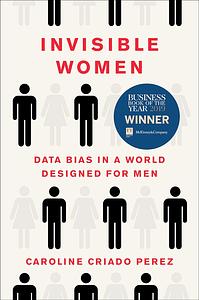Take a photo of a barcode or cover
informative
inspiring
reflective
medium-paced
informative
inspiring
medium-paced
challenging
informative
inspiring
reflective
medium-paced
The main reason I would drop a star on this book is that it didn’t leave me with as many actionable steps as I would have wanted. Each chapter left me feeling more and more frustrated. I had to put it down multiple times while reading and do breathing exercises to calm down.
After a couple of weeks of digesting I still don’t have a ton of actionable takeaways except this - don’t assume you’re the default. It’s all too easy in any situation to assume that my own perception and experience is the norm. On an individual basis, this may limit me in a few areas but generally it’s not creating major harm. When you blow it out though to these societal issues: transportation, health care, product design, government policy, etc, that’s where the assumed default can be very harmful.
May add more thoughts later as I continue to digest…
After a couple of weeks of digesting I still don’t have a ton of actionable takeaways except this - don’t assume you’re the default. It’s all too easy in any situation to assume that my own perception and experience is the norm. On an individual basis, this may limit me in a few areas but generally it’s not creating major harm. When you blow it out though to these societal issues: transportation, health care, product design, government policy, etc, that’s where the assumed default can be very harmful.
May add more thoughts later as I continue to digest…
informative
slow-paced
A bad execution of a topic that had potential to be great. Probably still worth a read.
It’s brief so I’ll mention what I do think this book did well first: It was definitely pretty well researched and highlighted biases against woman, in places I never would have thought of. That’s all.
So what went wrong?
-This is non-fiction so it’s to be expected but, there was a lot of info/statistic dumping. A lot of the statistics were not needed as they were providing the same evidence as the previous statistics and I think the overuse of them, made some points slightly redundant.
-It’s unproductive. Okay there are all these problems, but what do you want us to do about them? All this achieves is making the reader angry and unless someone who can do something about the issues reads it (i.e policy makers and councillors), there’s not much point to it.
-Some of the “issues” were very first world problems. For example the author claims that the latest iPhone is too big for the average women to hold in one hand, but men can. So?? Nobody needs the latest iPhone anyway. Buy a phone you CAN hold - “problem” solved.
-Similarly, a lot of the issues felt like hugeee reaches to me. This commentary for example: “The standard women cannot hold a brick properly because they’re too big, unlike the standard man who can hold them easily. Bricks don’t have to be this size.” Why?? Why don’t bricks have to be that size? Do you want the whole structure of bricks to be changed to make them easier to hold?? And if it was made smaller, would this make it harder for men to hold considering they do make up around 90% of construction workers, so it makes more sense for it to be suited to them.
-Petty criticism, but it annoyed me hearing at least two Sheryl Sandberg book references, after hearing about what a terrible person she is from the last book I read and how her book is actually detrimental to woman.
-I think biology and psychology were ignored when facts were presented because not every job field is going to have a 50/50 split between men and women. Maybe, just maybee most women don’t want to work in construction or law enforcement?
Maybe I need to lower my standards because this isn’t terrible by any means, but it’s also not great.
I unfortunately don’t have the attention span for this
informative
medium-paced
challenging
funny
informative
reflective
medium-paced
A touch dense but very informative and well punctuated with comical remarks from author Pérez. Most women & AFAB readers will likely read this and feel the urge to scream things like "yeah!!" And "obviously!!" And "duh!!" Frequently as points are made which, for us, tend to follow logically with ease. Unfortunately like the many female sources cited in this book, I suspect most men will be inclined to dismiss it. Therein lies the issue of this topic.
A worthwhile read.
A worthwhile read.
informative
fast-paced
This is a niche read for sure. I love data. Love a good spreadsheet, love me some data analysis, love StoryGraph for all the data it tracks…you get it. But even for a data lover like me, this was a LOT.
The entire book is pretty much Criado Perez highlighting data showing that the world is unfairly skewed to make things easier for men. From products (phones, pianos, headsets), to time (unpaid labor, child leave), to safety (parks, seatbelts, violence), to language (gendered languages, male term as the assumed gender for groups, specifying “women’s” (sport) and assuming “men’s” sport), to health, men have a simpler time navigating the life we all live.
Criado Perez brings up super valid issues, but simply summarizes available data to do so. She also doesn’t present any new information or discuss any long-term, actionable changes to these challenges.
While I thought this was a pretty good listen, I don’t think it’s for everyone. I’d recommend this primarily if you’re passionate about data AND gender equality.
The entire book is pretty much Criado Perez highlighting data showing that the world is unfairly skewed to make things easier for men. From products (phones, pianos, headsets), to time (unpaid labor, child leave), to safety (parks, seatbelts, violence), to language (gendered languages, male term as the assumed gender for groups, specifying “women’s” (sport) and assuming “men’s” sport), to health, men have a simpler time navigating the life we all live.
Criado Perez brings up super valid issues, but simply summarizes available data to do so. She also doesn’t present any new information or discuss any long-term, actionable changes to these challenges.
While I thought this was a pretty good listen, I don’t think it’s for everyone. I’d recommend this primarily if you’re passionate about data AND gender equality.
Graphic: Sexism
Minor: Domestic abuse, Eating disorder, Misogyny, Rape, Sexual assault, Sexual violence, Toxic relationship, Violence, Medical content, Pregnancy, Sexual harassment, Injury/Injury detail
informative
medium-paced



